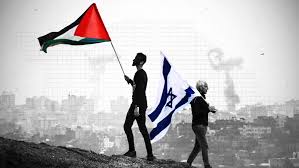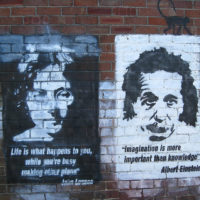

The Path to Peace Between Israel and Palestine
Having grown up as an only child, I have never known the sheer joy of arguing with a sibling day after bliss-inducing day. But after having witnessed my own two children literally argue over dirt, I feel I have gleaned at least some sagacity into the existential absurdity that marks much of human conflict. As soon as one of them registers a formal complaint regarding some injustice they believe themselves to have suffered at the hands of the other, that grievance will be met with a counter-charge, a retort harkening back to an episode from days, months, or even years earlier that somehow justifies their behaviour involved in the initial accusation. They, in their turn, will revisit an incident from even earlier than the one before it, thus setting in motion a never-ending succession of relived resentments. As such, as I have been asked when I was going to write about the recent escalation of violence between Israel and Palestine, I finally realized that I had just one insight to share about a situation that feels utterly hopeless and beyond reconciliation: If you are ever going to successfully unravel the multitudinous threads of disgruntlement and acrimony, you must do so by only addressing one thread of that conflict at a time. When you pull those Christmas lights out of the storage bin in the attic and they are tangled beyond comprehension, you are not going to unsnarl that mess by trying to pull the whole thing apart. Rather you must start at one end and address one convoluted entanglement at a time. And that, my friends, is the only approach that will ever bring peace to a region of the world that desperately needs it.
Take, for example, the impetus for all of this violence and bloodshed in the first place, a decades-old enmity that most Americans and Europeans are tragically unaware of, even after 9/11 and numerous other terrorist attacks that were intended to engage our attention. While we should all start with the fundamental premise that violence, especially against innocent civilians, is never an acceptable measure for redressing past wrongs, we must understand why the Muslim community in that region is so angry in the first place if we are to move these negotiations for a long-term resolution forward.
Believe it or not, the state of Israel did not exist prior to 1948. It was created through a partition plan passed by the UN General Assembly as a reaction to the deluge of displaced Jews left homeless after the liberation of the concentration camps at the end of World War II. Although Truman immediately recognized the created nation of Israel by declaring that his sympathies resided with the Jews and their desire for “self-determination”, the reality was that we simply didn’t want the Jews coming here in droves, and so we gave them a home of their own. Fueled by a latent anti-Semitism that still pervaded most of the globe at that time, as demonstrated by the fact that Truman himself knew about the concentration camps long before the United States decided to enter the war in order to protect its own self-interest, we wanted a solution to our Jewish problem, and creating the nation of Israel was our solution. But that solution came with a price for others. When we gave that land to the Jews, we displaced over 700,000 Palestinian Arabs. Now we could chase our tails going on and on ad infinitum about the long history of the land that Israel now sits on, but if we do not recogize the injustice that was done to these people who called that land home in 1946 and then suddenly had nowhere to go or call their own, we are never going to find a resolution to this conflict. Much as we did to the Native Americans where we took their land and then sent them off to live on reservations comprised of land that we didn’t want, we must acknowledge the miscarriage of justice that was inflicted on the Palestinians by the creation of the state of Israel and pledge to find a workable compromise that restores that trespass.
But make no mistake, although their offence is real and justified, the means that some in the Muslim community have taken to in order to avenge that wrong are simply unconscionable. And while we have all become far too accustomed to the senseless barrage of terrorist attacks, the actions taken by Hamas on October 7th seem to have taken all of these atrocities to a whole new level. What did they expect Israel’s reaction to be when they paraglided into music festivals to brutally slaughter hundreds of innocent victims and take hundreds more hostage? While Israel’s policies towards the Palestinians have been systemically unjust, they in no way justify open acts of planned violence, especially against unarmed civilians.
What is truly repugnant about all of these attacks is that Hamas had to know what Israel’s retribution would constitute. They had to know that these savage attacks would provoke an aggressive Israeli response in order to safeguard their own citizens. Hamas, knowing that Israel would have no choice but to take out their retaliation on a similarly innocent Palestinian citizenry, hid in cowardice behind the human shield of the very people they were supposedly acting to protect. They used their own people as the sacrificial lambs for forwarding their own agenda of violence and hate.
We have all heard from many of its practitioners that Islam is a religion founded in peace, love, and brotherhood, and that these terrorist attacks are the actions of a very small minority of extremists that do not represent them or their religion. And I, for one, believe them. But if that is so, it is time for the Muslim community to come out and actively disavow Hamas and their tactics of violence and bloodshed. It is time for everyday Palestinians to voice empathy for their Israeli brothers and sisters who lost loved ones on that bloody Saturday, and vow to support the efforts to bring the culprits to justice. Only that can move this discussion forward.

Because in the end, the only path forward comes from hearing the plight of the other side with compassion and empathy. Israelis need to understand and assuage the wrongs that were done to the unfortunate Palestinians displaced by the creation of Israel. And Palestinians need to acknowledge the heinous acts of violence that have been perpetrated in their names by an organization they say doesn’t represent them. Those are the first two strands that need to be undone in this entanglement before a lasting peace can even hope to be forged.
Steven Craig is the author of the best-selling novel WAITING FOR TODAY, as well as numerous published poems, short stories, and dramatic works. Read his blog TRUTH: In 1000 Words or Less every THURSDAY at www.waitingfortoday.com






This is a really beautifully written piece; thank you.
Thank you so much!